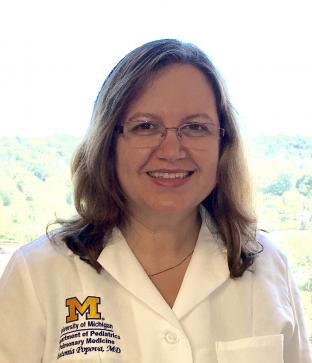Biography
Dr. Antonia P. Popova is a physician-scientist and an Assistant Professor in Pediatric Pulmonology. She completed her Pediatric Pulmonology Fellowship and a Research Fellowship at the University of Michigan. She joined as a faculty member in 2012 and has been supported by grants from NIH NHLBI, the Department of Pediatrics Amendt-Heller Award for Newborn Research and the Charles Woodson Collaborative Research Award.
Research Interests
I have had a long-standing clinical and translational interest in the mechanisms by which early-life exposures associated with preterm birth (e.g., hyperoxia or infection) activate and prime the pulmonary innate immune responses, resulting in long-lasting respiratory symptoms and lung disease. Our approach combines animal and in vitro experiments, and, in selected studies, human subjects research. Our goal is to uncover novel innate immune pathways responsible for prematurity-related chronic lung disease and identify new targets for therapeutic intervention. Current projects focus on:
1. Effect of early-life hyperoxia on lung innate immune responses and the development of bronchopulmonary dysplasia (BPD), a chronic lung disease of prematurity, and asthma. We are investigating the mechanisms by which early-life hyperoxia primes the pulmonary innate immune system and leads to enhanced inflammatory responses to respiratory viral infections. We focus on the role of damage-associated molecular patterns (DAMPs), released from hyperoxia-induced lung cell necrosis, and their effects on resident dendritic cell activation.
2. Role of infection and inflammation on impaired lung alveolar growth. Since inflammation and infection have been associated with BPD development, we have developed a novel mouse model of BPD by inoculating immature mice with bacterial endotoxin. We are investigating the contribution of recruited macrophages and other innate immune cells in bacterial endotoxin-induced pulmonary inflammation and impaired lung growth.

